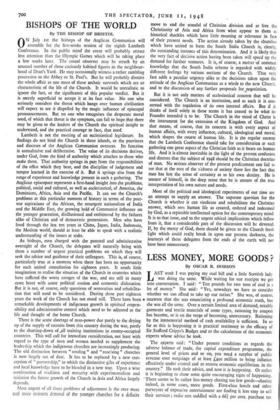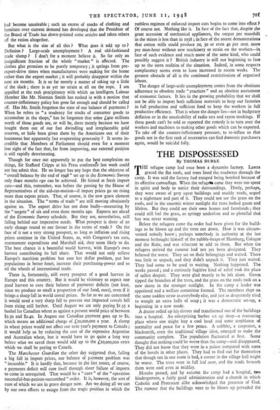LESS MONEY , MORE GOODS ?
By OSCAR R. HOBSON
TAST week I was paying my coal bill and a little Scottish lady was doing the same. While waiting for our receipts we got into conversation. I said: " Ten pounds for two tons of coal is a lot of money." She said : " Yes, nowadays we have to consider whether we can afford to take up our ration." She was, of course, unaware that she was enunciating a profound economic truth, but she was all the same. Over a certain limited area of demand, notably garments and textile materials of some types, rationing by coupon has become, or is on the verge of becoming, unnecessary. Rationing by the immemorial method of cash availability is sufficient. In so far as this is happening it is practical testimony to the efficacy of Sir .Stafford Cripps's Budget and to the calculations of the economic experts whose advice he took.
The experts said: " Under present conditions as regards the adverse balance of trade, the capital expenditure programme, the general level of prices and so on, you need a surplus of public revenue over outgoings of at least L40o million to bring inflation effectively under control and to restore economic equilibrium in the country." He took their advice, and now it is happening. Or rather it is beginning to show some quite encouraging signs of happening. There seems to be rather less money chasing too few goods—chasing indeed, in some cases, more goods. First-class hotels and other purveyors of expensive entertainment are finding it less easy to sell their services ; radio sets saddled with a 661 per cent. purchase tax had become unsaleable ; such an excess of stocks of clothing and furniture over current demand has developed that the President of the Board of Trade has down-pointed some articles and taken others off the ration altogether.
But what is the size of all this ? What does it add up to ?
Deflation ? Large-scale unemployment ? A real old-fashioned trade slump ? I don't for a moment believe it. So far only an insignificant fraction of the whole " market " is affected. The clothes glut promises to be purely temporary ; it springs from pre- export-drive times when manufacturers were making for the home rather than the export market ; it will probably disappear within the next six months. It is so far merely a matter of taking up a little of the slack ; there is- as yet no strain at all on the rope. I am appalled at the rash precipitancy with which an intelligent Labour Member like Mr. Norman Smith has rushed in with a motion that counter-inflationary policy has gone far enough and should be called off. Has Mr. Smith forgotten the state of our balance of payments ?
When he refers to " a tendency for stocks of consumer goods to accumulate in the shops," has he forgotten that some L40o millions worth of those goods are, or will be, there merely because we have bought them out of our fast dwindling and irreplaceable gold reserves, or have been given them by the Americans out of their
bounteous but apparently fast evaporating generosity ? It seems in- credible that Members of Parliament should even for a moment lose sight of the fact that, far from improving, our external position is still rapidly deteriorating.
Though for once out apparently to put the best complexion on things, Sir Stafford Cripps at his Press conferente last week could not but admit that. He no longer has any hope that the objective of
"overall balance by the end of 1948 " set up in the Economic Survey only ths....-e months ago can be achieved. He hinted at fresh import
cuts—and this, remember, was before the passing by the House of Representatives of the aid-cut-motion—if import prices go on rising more than export prices. That, of course, is the new grave element in the situation. The " terms of trade " are still moving obstinately against us. The export drive has not done badly—measuring by the " targets " of six and even three months ago. Exports are ahead
of the Economic Survey schedule. But they are, nevertheless, still falling behind our imperative needs. What prospect is there of an early change round to our favour in the terms of trade ? On the
face of it not a very strong prospect, so long as inflation and rising prices continue in the United States, as, with Congress's tax cuts, rearmament expenditure and Marshall aid, they seem likely to do.
The best chance is a bountiful world harvest, with Europe's own harvest contributing its full share. That would not only relieve Europe's nutrition problem but ease her dollar problem, put her populations in better heart, increase their purchasing-power and so oil the wheels of international trade.
There is, fortunately, still every prospect of a good harvest in Europe and this country. But it would be visionary to expect one good harvest to cure their balance of payments deficits (not least, since we produce so small a proportion of our food, ours), even if it brings a sharp fall in world cereal prices. So far as we are concerned it would need a very sharp fall to prevent our imported cereals bill from rising still farther. Until August we are only paying $5.55 a bushel for Canadian wheat as against a present world price of between $2.30 and $2.40. In August our Canadian payment goes up to $2, which means an additional charge of £2o,000,0oo a year. A slump in wheat prices would not affect our next year's payment to Canada ; it would help us by reducing the cost of the expensive Argentine and Australian wheat, but it would have to go quite a long way before what we saved there would add up to the £zo,000,000 extra which we shall be paying to Canada.
The Manchester Guardian the other day suggested that, failing a big fall in import prices, our balance of payment problem was
" incurable." It is hardly that, because in Ole last resort, of course, a payments deficit will cure itself through sheer' failure of imports to come in unrequited. That would be a " cure " of the " operation successful-but-patient-succumbed " order. It is, however, the sort of cure of which we are in grave danger now. Are we doing all we can by our own efforts to escape from the tragic position in which the
ruthless regimen of enforced import cuts begins to come into effect ? Of course not. Nothing like it. In face of the fact that, despite the great accession of mechanical appliances, the output per manshift in the mines is less than in 1938 ; in face of the recent demonstrations that cotton mills could produce 20, 3o or even 4o per cent. more per man-hour without new machinery or strain on the workers in, face of such evidence and much more of the same kind, who could possibly suggest it ? British industry is still not beginning to face up to the stern realities of the situation. Indeed, in some respects complacency seems even to have increased in recent weeks. The greatest obstacle of all is the continued restrictionism of organised labour.
The danger of large-scale unemployment comes from the obstinate adherence to obsolete trade " practices " and an obsolete assessment of economic factors. It lies in the growing probability that we shall not be able to import both sufficient materials to keep our factories in full production and sufficient food to keep the workers in full productive efficiency. That is where the danger lies—not in budgetary deflation or in the unsaleability of radio sets and rayon stockings. If these goods can't be sold or exported the remedy is to turn over the workers and machines to making other goods which can be exported. To take off the counter-inflationary pressure, to re-inflate so that goods not in the first rank of necessaries can find domestic purchasers again, would be suicidal folly.































 Previous page
Previous page